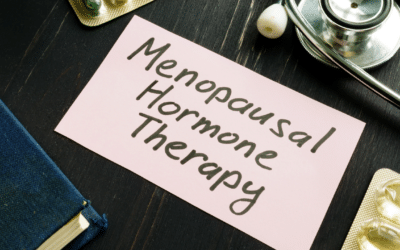Hormone replacement therapy (HRT) has been a hotly debated topic for decades, leaving many women—and even doctors—unsure about its risks and benefits. Much of the confusion stems from a single, oversimplified headline that misrepresented a major study’s findings. Here’s what you need to know to make sense of the controversy.
The Women’s Health Initiative (WHI) Study: What Went Wrong?
In the early 2000s, the Women’s Health Initiative (WHI)—a large clinical trial—set out to determine whether estrogen could help prevent chronic diseases like heart disease and cognitive decline in postmenopausal women. Over 16,000 women were given either:
- Conjugated estrogens (Premarin) – a synthetic mix of estrogens (estradiol + estrone)
- Conjugated estrogens + medroxyprogesterone acetate (MPA, a progestin) – for women with a uterus
- A placebo
Key Problems with the Study:
- Outdated Hormones – The study used Premarin (not bioidentical estrogen) and MPA (a progestin, not natural progesterone)—both now known to carry higher risks.
- Age & Timing Issues – The average participant was 63, meaning many had been in menopause for over a decade before starting HRT. We now know HRT is safest when started early in perimenopause or menopause.
- Misleading Headlines – The study was stopped early due to a slight increase in breast cancer risk, but the actual numbers were tiny:
- Placebo group: 4 in 1,000 women developed breast cancer
- HRT group: 5 in 1,000 women developed breast cancer
- Only the estrogen + progestin group saw this small increase; estrogen-only therapy actually reduced breast cancer risk over time.
Yet, the media declared: **”Estrogen causes breast cancer!”**—leading to widespread fear and a sharp decline in HRT prescriptions, leaving countless women without relief from debilitating symptoms.
What We Know Now: HRT Safety Updates
Since the WHI study, decades of research have clarified HRT’s risks and benefits. Key takeaways:
1. Not All Estrogens Are the Same
- Bioidentical Estradiol (patches, gels, creams) is now the safest option—it closely matches the body’s natural estrogen.
- Oral Estrogens (pills) carry a higher risk of blood clots and stroke compared to transdermal (patch/gel) estrogen.
2. Progestin vs. Progesterone: A Critical Difference
- Progestins (like MPA) increase breast cancer risk, heart disease, and cognitive decline.
- Natural Micronized Progesterone (Prometrium) is neuroprotective, helps with sleep, reduces anxiety, and does not carry the same risks as synthetic progestins.
3. Timing Matters: The “Window of Opportunity”
- Starting HRT within 10 years of menopause (or during perimenopause) provides the most benefits with the least risks.
- Starting after age 60 or long after menopause may increase cardiovascular risks.
4. HRT Benefits Beyond Symptom Relief
- Reduces bone loss (osteoporosis risk)
- Improves mood, sleep, and brain function
- May lower heart disease risk when started early
Should You Consider HRT?
HRT isn’t one-size-fits-all—it’s a personal decision based on:
✔ Your symptoms (hot flashes, insomnia, mood swings, vaginal dryness)
✔ Your age & time since menopause
✔ Your health history (breast cancer risk, heart disease, blood clots)
✔ The type of hormones used (bioidentical vs. synthetic)
Key Questions to Ask Your Doctor:
- **”Is transdermal estrogen an option for me?”** (safer than pills)
- **”Can I use natural progesterone instead of a progestin?”**
- **”Am I within the ‘window of opportunity’ for HRT benefits?”**
The Bottom Line
HRT isn’t the villain it was made out to be—when used correctly, it can dramatically improve quality of life for women in menopause. The key is individualized treatment with the right hormones, at the right time, in the right form.
If you’re struggling with menopause symptoms, don’t let outdated fears stop you from exploring HRT with a knowledgeable provider. Informed choices—not fear—should guide your decisions.
Would you like help finding a menopause specialist or more details on bioidentical hormones? Let me know how I can support you!







